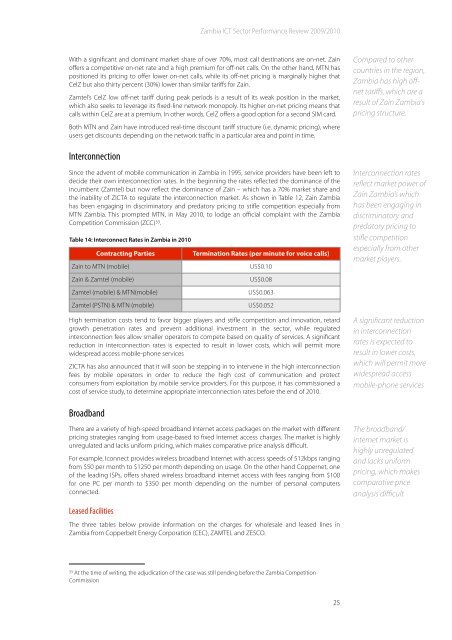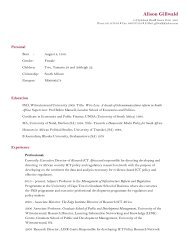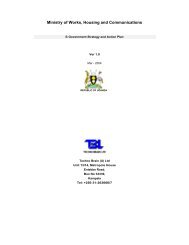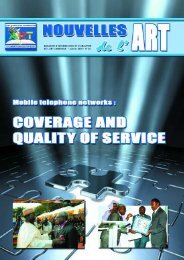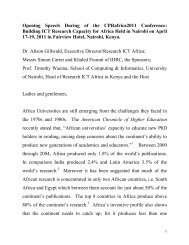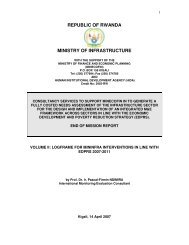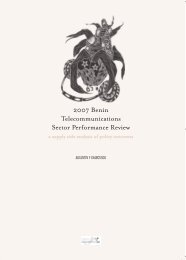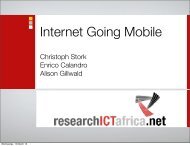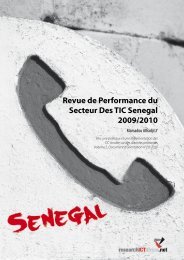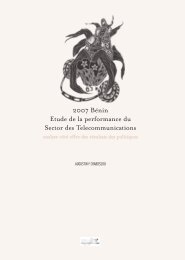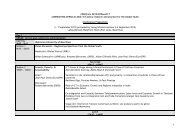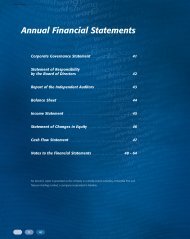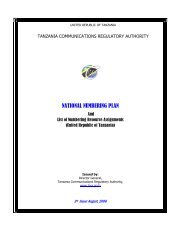Zambia ICT Sector Performance Review 2010 - Research ICT Africa
Zambia ICT Sector Performance Review 2010 - Research ICT Africa
Zambia ICT Sector Performance Review 2010 - Research ICT Africa
You also want an ePaper? Increase the reach of your titles
YUMPU automatically turns print PDFs into web optimized ePapers that Google loves.
<strong>Zambia</strong> <strong>ICT</strong> <strong>Sector</strong> <strong>Performance</strong> <strong>Review</strong> 2009/<strong>2010</strong><br />
With a significant and dominant market share of over 70%, most call destinations are on-net. Zain<br />
offers a competitive on-net rate and a high premium for off-net calls. On the other hand, MTN has<br />
positioned its pricing to offer lower on-net calls, while its off-net pricing is marginally higher that<br />
CelZ but also thirty percent (30%) lower than similar tariffs for Zain.<br />
Zamtel’s CelZ low off-net tariff during peak periods is a result of its weak position in the market,<br />
which also seeks to leverage its fixed-line network monopoly. Its higher on-net pricing means that<br />
calls within CelZ are at a premium. In other words, CelZ offers a good option for a second SIM card.<br />
Both MTN and Zain have introduced real-time discount tariff structure (i.e. dynamic pricing), where<br />
users get discounts depending on the network traffic in a particular area and point in time.<br />
Interconnection<br />
Since the advent of mobile communication in <strong>Zambia</strong> in 1995, service providers have been left to<br />
decide their own interconnection rates. In the beginning the rates reflected the dominance of the<br />
incumbent (Zamtel) but now reflect the dominance of Zain – which has a 70% market share and<br />
the inability of Z<strong>ICT</strong>A to regulate the interconnection market. As shown in Table 12, Zain <strong>Zambia</strong><br />
has been engaging in discriminatory and predatory pricing to stifle competition especially from<br />
MTN <strong>Zambia</strong>. This prompted MTN, in May <strong>2010</strong>, to lodge an official complaint with the <strong>Zambia</strong><br />
Competition Commission (ZCC) 33 .<br />
Table 14: Interconnect Rates in <strong>Zambia</strong> in <strong>2010</strong><br />
Contracting Parties<br />
Zain to MTN (mobile)<br />
Zain & Zamtel (mobile)<br />
Zamtel (mobile) & MTN(mobile)<br />
Zamtel (PSTN) & MTN (mobile)<br />
Termination Rates (per minute for voice calls)<br />
US$0.10<br />
US$0.08<br />
US$0.063<br />
US$0.052<br />
High termination costs tend to favor bigger players and stifle competition and innovation, retard<br />
growth penetration rates and prevent additional investment in the sector, while regulated<br />
interconnection fees allow smaller operators to compete based on quality of services. A significant<br />
reduction in interconnection rates is expected to result in lower costs, which will permit more<br />
widespread access mobile-phone services<br />
Z<strong>ICT</strong>A has also announced that it will soon be stepping in to intervene in the high interconnection<br />
fees by mobile operators in order to reduce the high cost of communication and protect<br />
consumers from exploitation by mobile service providers. For this purpose, it has commissioned a<br />
cost of service study, to determine appropriate interconnection rates before the end of <strong>2010</strong>.<br />
Broadband<br />
There are a variety of high-speed broadband Internet access packages on the market with different<br />
pricing strategies ranging from usage-based to fixed Internet access charges. The market is highly<br />
unregulated and lacks uniform pricing, which makes comparative price analysis difficult.<br />
For example, Iconnect provides wireless broadband Internet with access speeds of 512kbps ranging<br />
from $50 per month to $1250 per month depending on usage. On the other hand Coppernet, one<br />
of the leading ISPs, offers shared wireless broadband internet access with fees ranging from $100<br />
for one PC per month to $350 per month depending on the number of personal computers<br />
connected.<br />
Compared to other<br />
countries in the region,<br />
<strong>Zambia</strong> has high offnet<br />
tariffs, which are a<br />
result of Zain <strong>Zambia</strong>'s<br />
pricing structure.<br />
Interconnection rates<br />
reflect market power of<br />
Zain <strong>Zambia</strong>’s which<br />
has been engaging in<br />
discriminatory and<br />
predatory pricing to<br />
stifle competition<br />
especially from other<br />
market players.<br />
A significant reduction<br />
in interconnection<br />
rates is expected to<br />
result in lower costs,<br />
which will permit more<br />
widespread access<br />
mobile-phone services<br />
The broadband/<br />
internet market is<br />
highly unregulated<br />
and lacks uniform<br />
pricing, which makes<br />
comparative price<br />
analysis difficult<br />
Leased Facilities<br />
The three tables below provide information on the charges for wholesale and leased lines in<br />
<strong>Zambia</strong> from Copperbelt Energy Corporation (CEC), ZAMTEL and ZESCO.<br />
33 At the time of writing, the adjudication of the case was still pending before the <strong>Zambia</strong> Competition<br />
Commission<br />
25


